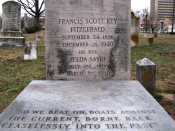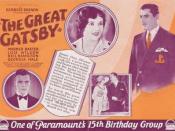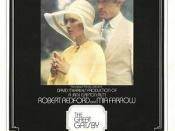Date: March 13th 09The Great Gatsby and the Corruption of the American DreamAs people we are incapable of comprehending the unhappiness we bring upon ourselves with are desire to achieve the American dream. Proof of this materialistic belief of happiness comes from the novel the Great Gatsby, the protagonist Jay Gatsby is possessed for five years by the memory of the loss of the women of his dreams (Daisy Buchanan) his American dream is marrying Daisy. In GatsbyÃÂs quest for his American dream, he loses the boundary between fantasy and reality. His pursuit of being with Daisy causes Jay to become infatuated with money and the lifestyle of the rich, this occurs because the only true love Daisy has is the love of money. Gatsby becomes obsessed with the thought of being with Daisy and does anything to please her needs, he eventually becomes a bootlegger to gain the money that she demands and begins living a fake life to win her back.
The idea of striving for a better life by achieving the American dream is not necessarily corrupt although the corruption occurs when an individual is willing to contradict their morals and innocence. In this novel, Fitzgerald demonstrates this corruption associated with the never-ending process of achieving the American dream.
Throughout GatsbyÃÂs journey, his overwhelming need to achieve his dream of being with Daisy corrupts his mind to the point of where the boundary between fantasy and reality is lost. Gatsby towards the end of the novel is so close to achieving his American dream that he loses his grasp on reality and believes his fantasy is reality. When Gatsby allowed Daisy to drive his vehicle home, which resulted in the death of Myrtle, GatsbyÃÂs only concern was the well-being of Daisy. He was unable to understand that someoneÃÂs life had ended reassuring that his mindset was in a distorted state. His obsession with Daisy consumes all of his thought he had zero concern or remorse for the events that took place in reality. ÃÂHe spoke as if DaisyÃÂs reaction was the only thing that mattered (Fitzgerald 151) In GatsbyÃÂs mind he truly believes that he could relieve the past and return to the way DaisyÃÂs and his relationship was at one time. This ludicrous belief clearly shows Jays inability to judge fantasy from reality. When Nick allows Gatsby to know that no one can repeat the past he responds, ÃÂCanÃÂt repeat the past, why of course you can!ÃÂ (Fitzgerald 106). While lying on his deathbed Gatsby continued to believe that Daisy would return to marry him, refusing to let go of his fantasy. Daisy never had a true desire to marry Gatsby and leave Tom, Gatsby was just a pawn in her scheme to create jealousy for Tom. Gatsby mind was lost in a state of fantasy even though it was brutally obvious Daisy had no interest he would never consider this scenario as a possible. "The trouble with Gatsby's quest was that Daisy was completely incapable of playing the role assigned to her." (Trask 214) In GatsbyÃÂs confused world he assumes that becoming wealthy and throwing extravagate parties is enough to win a womenÃÂs love.
GatsbyÃÂs need for money to obtain his dream enables him to realize that in order to love Daisy he most develop a love for money. Gatsby loses sight of his morals of honour and respect because he forces himself to believe that the solution to all of his problems is simply money. After many years of trying to obtain his empire so that he would impress Daisy, Gatsby goes so far as to associate his lifeÃÂs one and only love with money. Jay responds to Nicks comment on the beauty of Daisy voice by saying, ÃÂÃÂHer voice is full of money,àhe said suddenlyà(Fitzgerald 127). GatsbyÃÂs new found love for money corrupts him so much that once he amassesHis extravagant possessions such as his lavish mansion and one of a kind vehicles, Gatsby loses sight of the real reason that he loved Daisy. Which was that she completed him and loved him as no other had; he is unaware that he now loves money. Gatsby takes his wealth to the extremes. Everything he has is exaggerated that it utterly sets him apart from the rest of society. ÃÂA colossal affair by any standard àit was a factual imitation of some Hôtel de Ville in Normandy, with a tower on one side, spanking new under a thick beard of raw ivy, and a marble swimming pool and more than forty acres of lawn and garden. It was GatsbyÃÂs mansionà(Fitzgerald 9). A famous quote from the bible reads the following, ÃÂFor the love of money is the root of all kinds of evil, some people, and eager for money have wandered from the faith and pierced them with many griefsà(Timothy 6:10). GatsbyÃÂs love for money leads him astray from his real goal, to be loved by Daisy. JayÃÂs love for money tarnishes his vision of the American dream because he is more concerned with being accepted in a society that will never do so rather than loving Daisy. He used to pray and pled for the love of Daisy although now that he has what Daisy desires he assumes that Daisy owes him her love. Gatsby no longer is pleased with Daisy just loving him he now feels that she should only be capable of loving him and no other. GatsbyÃÂs dream causes him to require only the best. He does not realize that his love for Daisy has caused him to long for money and material wealth. Gatsby as many others before him and to come believed that money buys happiness, Trask supports this theory stating, "Americans easily assumed that spiritual satisfaction would automatically accompany material success" (Trask 213). Gatsby does not see that the corruption at the base of his fortune, in turn he compromises his vision of the American dream.
Gatsby corruption in simple comes from his destruction of the morals and simplicity that made him an iconic figure. Gatsby was a man of valour who received great honours in world war one, the values needed to succeed as such a soldier include honour, awareness, and honesty. Gatsby was the epitome of a human, only achieving greatness his greatness was demonstrated by the medal he received in the war. ÃÂHe reached in his pocket and a piece of metal, slung on a ribbon, fell into my palm. ÃÂThatÃÂs the one from Montenegro.ÃÂ To my astonishment the thing had an authentic look. Orderi di Danilo, ran the circular legend, Montenegro, Nicolas Rex. ÃÂTurn it.ÃÂ Major Jay Gatsby, I read, For Valour ExtraordinaryÃÂ(Fitzgerald 71).Gatsby spits upon all of these qualities to achieve large sums of money. He becomes a large bootlegger and associates himself with shady characters such as Wolfshiem. The irony found in GatsbyÃÂs situation is that by corrupting himself to the point of relying on illegal methods of making money, was the one thing that was holding him back from achieving the status in society, which is required to be loved by Daisy. Gatsby, similar to the majority of people haunted by the pursuit of the American dream is willing to make the ultimate sacrifice for their image of ÃÂsuccessÃÂ. GatsbyÃÂs ill judgment eventually leads to his death because his lack of concern for what is right allows Wilson to find and murder Gatsby.
Gatsby was to die alone with his dream unfulfilled, without love. It was the end for Gatsby, but it wasnÃÂt Wilson that killed Gatsby; it was his love of money, being unable to judge fantasy from reality and displaying no concern for what is right. GatsbyÃÂs dream caused him to make some decisions that he shouldnÃÂt have made, his mind was clouded by his love for Daisy. ÃÂ ÃÂWas Daisy driving?ÃÂ ÃÂYes,ÃÂ he said after a moment, ÃÂbut of course IÃÂll say I wasÃÂ and this woman rushed out at us just as we were passing a car coming the other way.ÃÂ (151). By allowing Daisy to drive Gatsby was in part responsible for the death of Myrtle. Wilson thought it was Gatsby driving so he decided to kill Gatsby. The one thing that allowed Wilson to track down Gatsby was the immensely wealthy and lavish life that Gatsby lived, such as the magnificent car that Gatsby drove. ÃÂGatsbyÃÂs gorgeous cream-colored car is also the indirect cause of his own death, as it is the deep imprint of the fantastic car on his excited brain that enables Wilson (through Tom Buchanan) to track Gatsby down and shoot him (erroneously, of course) for killing MyrtleÃÂ (Hooper 3). Gatsby, rather it is bootlegging or being responsible for the death of Myrtle lost his innocence to corruption. Gatsby epitomized the corruption of the American Dream as the desire for money and worldly pleasures overshadowed the true values of the American Dream.
âÂÂWorks CitedFitzgerald, F. Scott. The Great Gatsby. Simon and Schuster Inc., New York: 1991.
Hooper, Osman C. "Fitzgerald's ÃÂThe Great Gatsby'," The Critical Reputation of F. ScottFitzgerald. Article A353. Ed. Jackson Bryer. Archon Books, Maryland: 1967.
Trask, David F. "The End of the American Dream," Fitzgerald's The Great Gatsby: The Novel,The Critics, The Background. Ed. Henry D. Piper Charles Schribner's Sons, New York: 1970.





